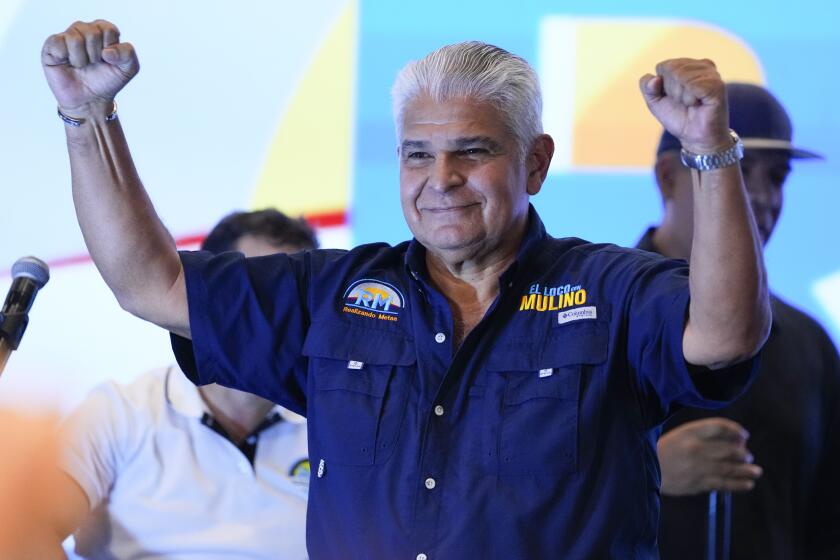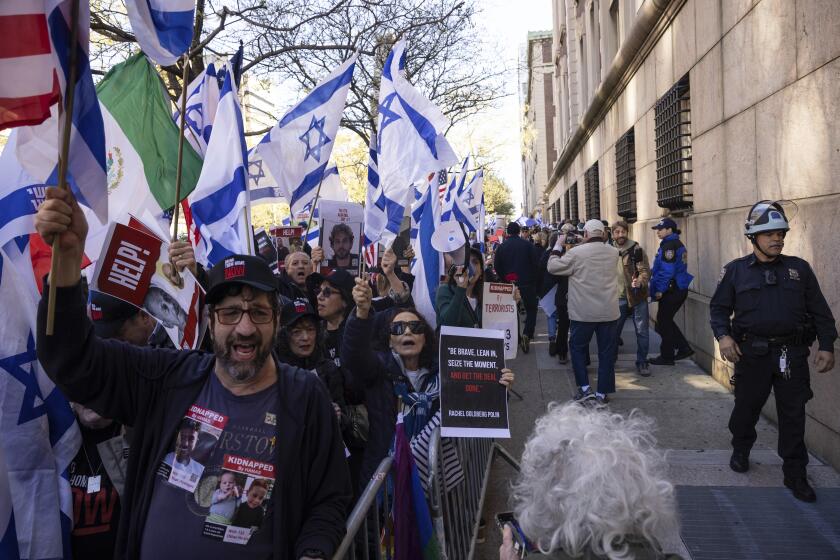Algerian Election to Test Strength of Radical Islam
A 7-year-old boy, his tiny head topped with a white skullcap, raised his reedy voice and exhorted the faithful to take over the country. As he screamed Allah’s name, the voices of nearly 150,000 people in the stadium around him raised in song. Many began weeping.
“No constitution,” they sang. “No law. The only law is the law of God.”
The boy, presented as the “child of Islam,” was the son of imprisoned Muslim leader Ali Belhaj, whose Islamic Salvation Front party is poised to capture the hearts and minds--and the ballots--of Algerian voters as they go to the polls today for the country’s first free national elections since independence in 1962.
Later, after the passionate scene was replayed on the evening news, businessman Mokhtar Missoumi shook his head in disgust. “People crying over a 7-year-old? Why? Because they don’t use their minds.”
More than 12 years after the politics of radical Islam injected itself into the Middle East in Iran, the Arab world’s first legalized Muslim party is about to be put to its first important test at the polls. The future of Muslim fundamentalism all over North Africa could be reflected in the outcome of today’s contest for the 430-seat National Assembly.
“The danger is that from Algeria they can extend to Tunisia, to Morocco, to the African Saharan countries, and where does it stop?” asked an Algerian Foreign Ministry official.
The powerful Islamic Salvation Front, which swept municipal balloting in 1990 with 55% of the vote, presents the strongest palpable challenge to the dominion of Algeria’s National Liberation Front, the party that led the country’s bloody revolution against France and then ruled it single-handedly for nearly 30 years.
A handful of pro-democracy parties stand to gain some votes from an electorate largely disillusioned with three decades of corruption and economic mismanagement at the hands of the National Liberation Front. These parties include: the Movement for Democracy in Algeria, headed by former president Ahmed Ben Bella; and two Berber parties, the Socialist Forces Front--headed by revolutionary war hero Hocine Ait Ahmed--and the Rally for Culture and Democracy.
There will be a Jan. 16 runoff for seats in which no party gains an absolute majority.
The campaign was a toss-up until two weeks ago.
The Islamic Salvation Front--with leaders Belhaj and Abbasi Madani jailed on charges of trying to incite the violent overthrow of the government and with the party still stinging from a massive army crackdown on the fundamentalists who left the country under a state of siege for three months this summer--had threatened until the last minute to boycott the elections. That threatened to leave the government in the uncomfortable position of staging its first free elections minus the only opposition party that has managed to garner massive popular support.
Sources close to the government say one drawing card was a secret government offer to try Belhaj and Madani in a civilian and not a military court after the elections, in exchange for the Islamic Front’s participation in the balloting.
Its leaders have publicly demanded the release of both men and the return to work of an estimated 4,000 activists who lost their jobs after participating in the party-sponsored general strike last May.
Abdelkadir Hachani, the Islamic movement’s most senior leader to be released from prison after the crackdown, sat silently at a news conference this week, his head bowed, as a man next to him sang verses from the Koran. Finally, he raised his head, revealing the fundamentalists’ trademark forehead bruise from five daily sessions of head-thumping prayer.
“We decided to participate in the elections so we can destabilize the regime and make it lose its credibility,” Hachani said. “Also so that we can assure a firm beginning for building an Islamic state, with the help of God the Almighty.”
He predicted that the party will win 70% of the vote. Government officials say privately they don’t expect it to get more than 30%, although that may be wishful thinking. In a country without opinion polls, nobody knows.
The Islamic Front has been relatively powerless in running the country’s municipal councils. The councils have no authority to address Algeria’s crippling economic and social problems, which analysts say have been the party’s largest sources of attraction. The National Assembly, still made up entirely of National Liberation Front deputies, prevented Islamic Front-dominated councils from passing laws banning alcohol in local districts.
But thousands of young Algerians seem entranced by the party’s promises that there is an Islamic solution to the country’s 25% unemployment, 20% inflation and dismaying lack of housing. The absence of suitable living quarters not only disrupts Algerians’ domestic lives; it also forces hundreds of thousands of young men--an estimated 70% of the population is younger than 25--to spend much of their time idling in teeming coffee shops or on the streets.
Islamic Front leaders--many of whom are highly educated doctors, scientists and university professors--contend that a nation that follows God can channel its resources away from corruption and into housing and jobs. They deplore an educational system that leaves many graduates illiterate in both French and Arabic and has some primary schoolteachers handling students in classes of up to 60 each in two shifts a day.
“People are afraid of us, perhaps because they don’t understand us,” said Fouad Delissi, 40, a party leader in the popular quarter of Bab al Oued and maintenance director for Algeria’s petroleum products retailing company. “If there are people who consider themselves democrats . . . it’s us.
“The majority of us,” he added, “are people who made their studies in the United States, or in France, who want to guide the country in a scientific, normal, modern way. . . . We are religious, but . . . this is normal. We are also for progress, for opening. . . . We simply don’t want any more of (the National Liberation Front) way of doing things. The country is falling apart.”
Many Algerians, especially those who consider themselves in many ways more French than Arab, complain that the Muslims will bring an end to Algiers’ easygoing, seaside lifestyle without having any real program to end the nation’s crippling economic woes, including the $25-billion foreign debt, three-quarters of which is due by 1993.
The Islamic Front “has a very simplistic slogan--’Islam is the answer.’ But when you ask them, what is the definition of Islam? No answer,” complained Missoumi, who runs a government iron and steel company.
Many of Algeria’s most democratic-minded citizens applauded when army tanks moved into the streets last June to quell a general strike called by the Islamic Front that erupted into violence, leaving at least 55 dead.
“Everyone applauded the state of siege. Everyone,” said Omar Belhouchet, publisher of the daily Al Watan, the best-read of the dozens of independent newspapers that sprang up when the government cleared the way for new publications. “Why? The first reason is that among intellectuals, among women, among democrats, among most of the political parties, people were very much afraid of the (Islamic Front); they felt that (the party) was an imminent danger to the country.”
But he said Algerians found a pleasant surprise in the army crackdown on the party: The military showed that it could conduct a “police action” without “halting the course of democracy, nor freedom of expression,” he said. “That was an enormous comfort . . . It . . . made a lot of people say that we were in the midst of a very unique situation: an army defending democracy.”
Just what role the army will play in the wake of today’s elections is a subject of intense speculation. The interior minister has pledged that the army will not intervene in the voting.
But sources said the army has moved significantly away from the wait-and-see role it had played. It now is actively gathering intelligence on voter opinion and preventing outbreaks of violence.
Women, who make up 51% of the electorate, could make a difference in the voting. A law allowing husbands to vote for their wives by presenting a family identification card, a key Islamic Front strategy, was declared unconstitutional this fall. Men now can cast proxy votes only through a complex procedure.
Although thousands of veiled women attended this week’s Islamic Front rally, many Algerian women don’t take kindly to statements like the one made by Belhaj, who said women’s primary duty is “to bear good Muslims.” Sheik Abdelkhader Moghni also complained in an October sermon that: “At a time when more than 1 million (are) jobless . . . women are occupying jobs for nothing--just to spend their salaries on makeup and dresses. They should return to their homes, and it is not I who demand this, but God.”
Hassida, a business woman, observed of the Islamic Front: “It’s going to be pig power. They’re all male chauvinist pigs, and believe me, we are worried.”
A young cab driver in Algiers expressed similar concerns, but said he didn’t like the National Liberation Front any better, especially since it has strangled the country for 30 years with one-party rule. “One is a fanatic, and one is a dictatorship, but it’s the same sickness,” he said. “We are caught between a pestilence and cholera.”
More to Read
Start your day right
Sign up for Essential California for news, features and recommendations from the L.A. Times and beyond in your inbox six days a week.
You may occasionally receive promotional content from the Los Angeles Times.






